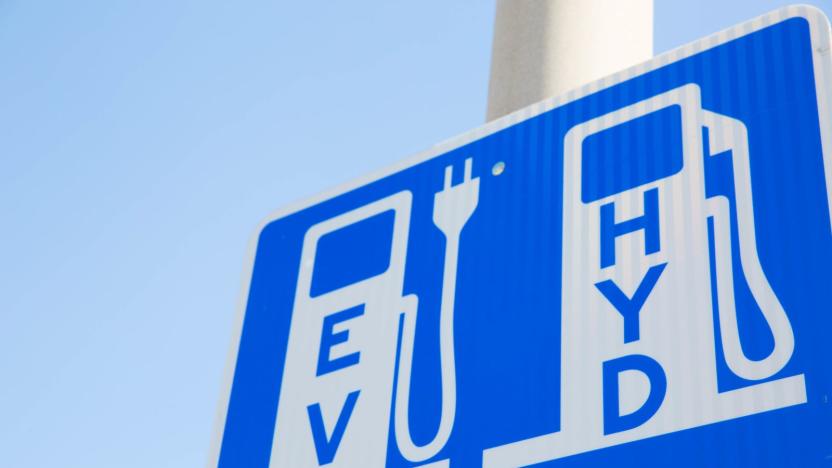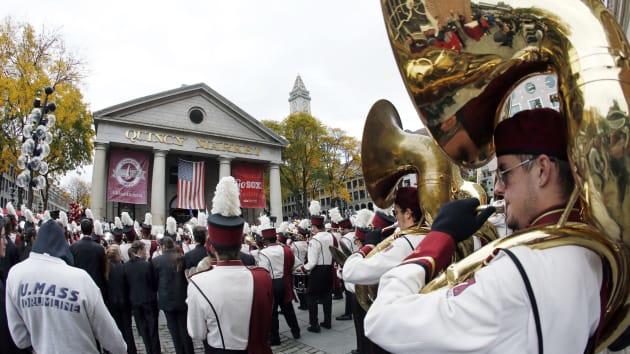umass
Latest

Researchers may have found a better way to make hydrogen for cars
While EVs have come a long way -- even Ford is making electric trucks -- they're still a far cry from perfect. One of the biggest complaints is that the batteries need to be plugged in and recharged, and even when they're charged, they have a limited range. Fuel cell electric vehicles offer an alternative. Their "battery" -- actually a hydrogen/oxygen fuel cell -- can be replenished with hydrogen gas. The biggest problem to-date has been that producing hydrogen isn't an environmentally friendly process. We would also need the infrastructure to refuel with hydrogen. But, new technology from UMass Lowell could remove those barriers.

Computers can categorize buildings into architectural styles
Even if you've never heard of "Byzantine," you can probably tell a Byzantine church from a Gothic one. Judging style differences is nearly impossible for a computer, however, and researchers from the University of Massachusetts want to fill in that gap. They used geometric matching, crowdsourcing and machine learning to teach an algorithm how to spot similar styles in buildings, furniture and other objects. That's something that could be incredibly useful for historians with mountains of photo archives, or game designers who need to auto-fill a level with historically accurate furniture.

Amazon takes on textbook sales at major universities
Amazon is set to open distribution centers at two large US colleges and offer students next-day delivery of textbooks and other items through co-branded websites. The universities of Massachusetts Amherst and Purdue say that the deal means students will save nearly $400 annually on textbooks. Amazon is also giving the schools a 0.5-2.5 percent cut, which will net at least $1.7 million in revenue for Purdue and $1.5 million for UMass over four years, according to the WSJ. The Amazon distribution center will completely replace the UMass textbook annex, currently operated by educational specialist Follett. That store will no longer carry course materials, but will continue to sell computers, clothing and other items.

Researchers shield implants from hackers with wireless charm of protection
Everything can be hacked -- that's an important detail to keep in mind as we start cramming wireless radios into our bodies attached to medical implants. Researchers have been working on ways to protect devices like pacemakers from ne'er-do-wells looking to cause, not just e-harm, but physical injury or even death. A new system developed jointly by MIT and UMass is much more sophisticated that earlier solutions, can be used with existing implants, and is worn outside the body allowing it to be removed in the event of an emergency. The shield, as it's called, acts as a sort of medical firewall, protecting implants from unauthorized access -- doctors send encrypted instructions to it which are decoded and relayed to device, while it blocks any signals not using the secret key. All that's left to do is figure out what sort of person would mess with someone's defibrillator.

Portal and Flight Simulator played on Microsoft Surface
Students at the University of Massachusetts Lowell Robotics Lab have adapted an "on-screen joystick" for use on Microsoft's Surface table with Portal and Flight Simulator. The DREAM (Dynamically Resizing Ergonomic and Multi-touch) controller is activated by putting five fingers on the table. The joystick will then resize itself to the user. The controls don't look nearly as efficient as a keyboard and mouse, or as comfortable as a gamepad, but it gives a good idea of the interface we may eventually use on the "iPad XL." Check out the video after the break for the full effect (and be prepared to mute the audio).

UMass Mobile Manipulator pushes things around, learns ways of the world
Robots teaching robots? Check. Robots teaching humans? Check. Robots learning things on their own accord? Um, terrifying? All kidding aside, the UMass Mobile Manipulator is one smart cookie. Put simply, this intelligent robot pushes objects around in order to identify how they move, and once that's accomplish, it begins "manipulating them to perform tasks." If this sounds awfully similar to something your infant does, that's because the two are indeed very much related. UMan, as it's so eloquently dubbed, packs its own wheels, battery pack, one-meter arm, three-fingered hand and webcam in order to interact with the world, and sure enough, one researcher even mentioned the potential of it learning to operate a pair of scissors. Great, what's next -- a BFG?[Via CrunchGear]

GPS-enabled helmet calls for help post-accident
We've seen some pretty well equipped helmets in our day, but UMass Amherst student Brycen Spencer seems a touch more interested in safety advancements than integrated speakers. His concoction, dubbed the Wireless Impact Guardian (WIG), looks like your average helmet at first glance, but a quick look inside reveals electronics designed to sense an impact, judge if you're conscious and dial for help if necessary. Essentially, an alarm is triggered upon impact, and if you're not cohesive enough to disable it after 60 seconds, it automatically rings up 911 and beams out your location via GPS so that medical personnel can get moving. Currently, the device is quite a ways from going commercial, but considering that Mr. Spencer has already invested in a provisional patent, we'd say it's well on its way.[Via textually]

Turtles don solar-powered communicators in the name of science
For biologists who aren't down with tracking blazing fast cheetahs and computer engineers who aren't keen on their hardware just galloping away, strapping solar-powered communicators on none other than a 40-pound turtle was a no-brainer. Dubbed M16, the giant snapper commandeered by scientists from the University of Massachusetts is now sporting a "postcard-sized waterproof computer" that tracks and records data about the endangered species and beams it back to the campus when the creature moseys on by a base station. Much like a few military applications we've seen, the idea here is to "create a network of constantly moving devices (or animals) that record and store information, transmit data from one device to another," and finally upload it into a database. No word on whether webcams or high-powered lasers will get added in to the second wave of shell-bound rigs.




